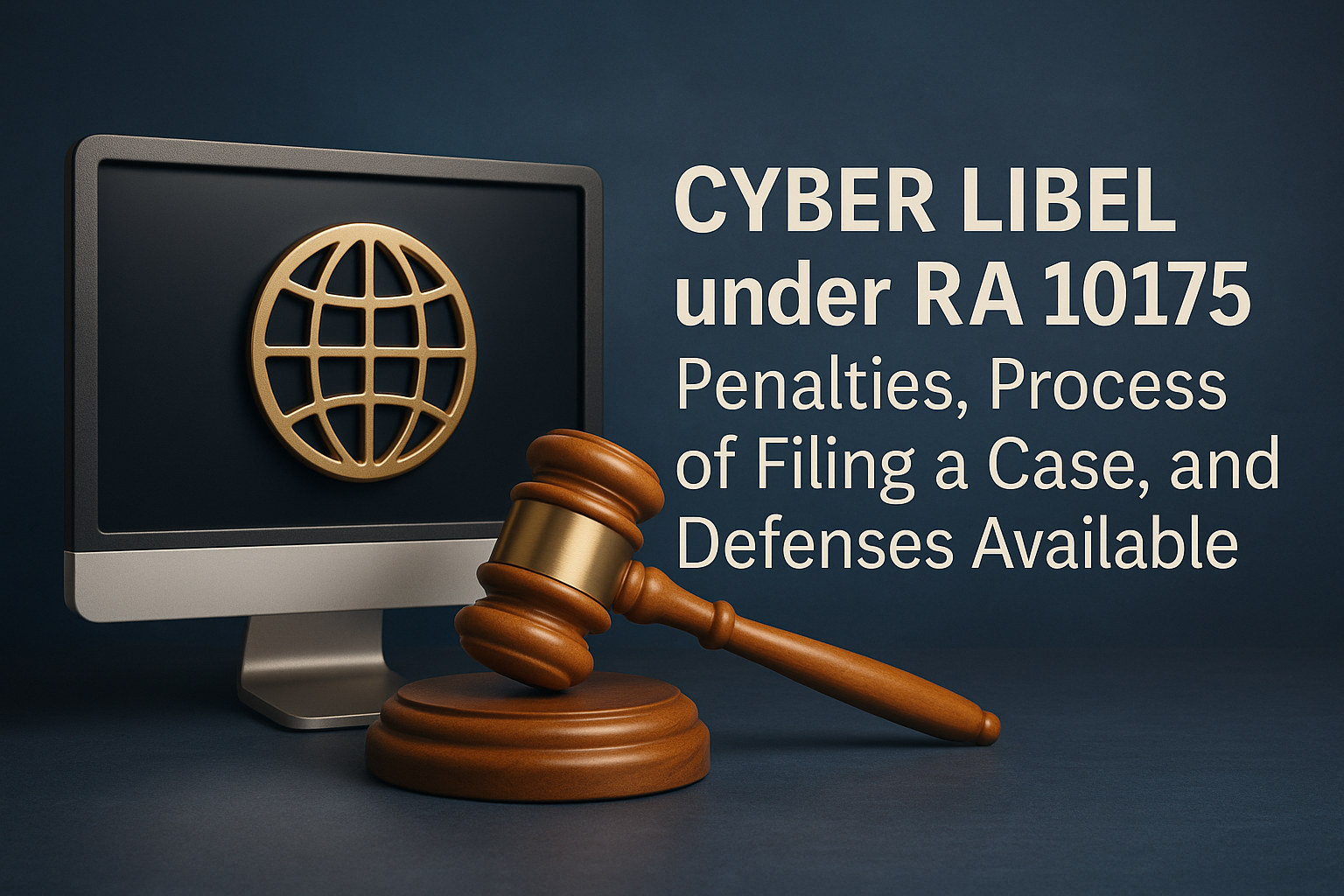In the digital age, the proliferation of social media and online platforms has revolutionized communication. Yet, it has also given rise to new forms of criminal liability. Among these is cyber libel, a crime that has become increasingly relevant in the Philippines with the passage of Republic Act No. 10175, otherwise known as the Cybercrime Prevention Act of 2012. This law specifically addresses offenses committed through information and communications technology, including libelous acts that were traditionally prosecuted under the Revised Penal Code (RPC).
This article provides a comprehensive, in-depth discussion of cyber libel under RA 10175, focusing on its penalties, the process of filing a case, and the defenses available to the accused. The analysis is grounded in the latest statutory provisions and Supreme Court jurisprudence, particularly the landmark case of People v. Soliman (2023), and is intended to serve as a practical guide for lawyers, law students, and the general public.
What is Cyber Libel under RA 10175?
A. Definition
Libel is defined under Article 353 of the Revised Penal Code as:
“a public and malicious imputation of a crime, or of a vice or defect, real or imaginary, or any act, omission, condition, status, or circumstance tending to cause the dishonor, discredit, or contempt of a natural or juridical person, or to blacken the memory of one who is dead.”1
Cyber libel is simply libel committed through a computer system or any other similar means, as provided in Section 4(c)(4) of RA 10175 (2012). The law recognizes that the internet and digital platforms can be used to disseminate defamatory statements to a much wider audience, thus potentially causing greater harm.
B. Elements of Cyber Libel
The elements of cyber libel are essentially the same as those of traditional libel, with the added element that the defamatory imputation is made through a computer system or similar means. The elements are:
- There must be an imputation of a crime, vice, defect, act, omission, condition, status, or circumstance;
- The imputation must be made publicly;
- The imputation must be malicious;
- The imputation must be directed at a natural or juridical person, or the memory of one who is dead;
- The imputation must tend to cause dishonor, discredit, or contempt; and
- The imputation is made through a computer system or similar means.
Penalties for Cyber Libel
A. Statutory Basis
Section 6 of RA 10175 (2012) provides that:
“All crimes defined and penalized by the Revised Penal Code, as amended, and special laws, if committed by, through and with the use of information and communications technologies shall be covered by the relevant provisions of this Act: Provided, That the penalty to be imposed shall be one (1) degree higher than that provided for by the Revised Penal Code, as amended, and special laws, as the case may be.”
This means that the penalty for libel, when committed online, is increased by one degree compared to traditional libel.
B. Range of Penalties
Under Article 355 of the RPC, as amended by RA 10951, the penalty for traditional libel is prision correccional in its minimum and medium periods or a fine ranging from P40,000 to P1,200,000, or both.
For cyber libel, the penalty is one degree higher. The Supreme Court in People vs. Soliman (2023) clarified the computation:
“…the maximum amount of fine for online libel shall be P1,500,000.00 (P1,200,000.00 + P300,000.00). Further, the minimum shall be unchanged at P40,000.00, following Article 75 of the RPC. Finally, the range of the penalty of fine for online libel shall be from P40,000.00 to P1,500,000.00.”— 2
| Type of Libel | Imprisonment | Fine Range |
| Traditional Libel | Prision correccional (6 months, 1 day to 4 years, 2 months) | P40,000 to P1,200,000 |
| Cyber Libel | Prision mayor (6 years, 1 day to 12 years) | P40,000 to P1,500,000 |
The court has discretion to impose either imprisonment, a fine, or both. In People v. Soliman (2023), the Supreme Court affirmed that a fine alone may be imposed, depending on the circumstances.
C. Corporate Liability
If cyber libel is committed on behalf of a juridical person (e.g., a corporation), Section 9 of RA 10175 (2012) provides for corporate liability, with fines up to double the amount imposable on individuals, and up to P10,000,000.00.
Process of Filing a Cyber Libel Case
A. Where to File
A complaint for cyber libel is generally filed with the Office of the City or Provincial Prosecutor where the complainant or any of the accused resides, or where the libelous post was accessed or first published.
B. Steps in the Criminal Process
1. Filing of Complaint-Affidavit
The aggrieved party (complainant) files a complaint-affidavit with supporting evidence (e.g., screenshots, URLs, printouts of the alleged libelous material).
2. Preliminary Investigation
The prosecutor conducts a preliminary investigation to determine whether there is probable cause to charge the respondent with cyber libel. Both parties may submit counter-affidavits and supporting documents.
3. Resolution and Filing of Information
If probable cause is found, the prosecutor issues a Resolution and files an Information for cyber libel before the appropriate Regional Trial Court (RTC), which has exclusive jurisdiction over cybercrime cases.
4. Arrest and Bail
If the court finds probable cause, it issues a warrant of arrest. The accused may post bail for provisional liberty.
5. Arraignment and Pre-Trial
The accused is arraigned and enters a plea. The court may conduct a pre-trial to narrow down the issues.
6. Trial
Both parties present their evidence. The prosecution must prove all elements of cyber libel beyond reasonable doubt.
7. Judgment
The court renders a decision. If found guilty, the accused is sentenced to the appropriate penalty.
8. Appeal
The convicted party may appeal the decision to the Court of Appeals and, ultimately, to the Supreme Court.
C. Prescriptive Period
The prescriptive period for cyber libel is one year from the date of publication, following Article 90 of the RPC. This was affirmed in People v. Soliman (2023).
Defenses Available in Cyber Libel Cases
The accused in a cyber libel case may avail of several defenses, both procedural and substantive. These defenses are rooted in the law, jurisprudence, and general principles of criminal law.
A. Truth as a Defense
If the defamatory statement is true and was published with good motives and for justifiable ends, it is a complete defense. However, the burden of proof is on the accused to establish the truth of the imputation.
B. Privileged Communication
Certain communications are privileged and are not actionable as libel, even if defamatory. These include:
Absolutely privileged communications: Statements made in the performance of official duties (e.g., in legislative or judicial proceedings).
Qualifiedly privileged communications: Statements made in the discharge of a legal, moral, or social duty, or in fair and true reports of official proceedings, provided there is no malice.
C. Lack of Malice
Malice is presumed in every defamatory imputation, but the accused may rebut this presumption by showing good faith, lack of intent to injure, or that the statement was made for a justifiable purpose.
D. Absence of Publication
If the allegedly libelous statement was not made public or was not accessible to others, there is no libel. Publication means knowledge of third persons of derogatroy remarks.
E. Not Identifiable
If the complainant is not identifiable from the statement, libel does not lie.
F. Prescription
If the complaint is filed beyond the one-year prescriptive period, the case may be dismissed.
G. Lack of Jurisdiction or Improper Venue
If the case is filed in the wrong venue or the court lacks jurisdiction, the case may be dismissed.
H. Other Defenses
No defamatory imputation: The statement does not impute a crime, vice, or defect.
No malice: The statement was made in good faith and without intent to defame.
Retraction: Retraction of the statement may mitigate liability, though it is not a complete defense.
Relevant Jurisprudence: People v. Soliman (2023)
The Supreme Court’s decision in People v. Soliman (2023) is instructive on several points:
Penalty: The Court clarified the computation of fines for cyber libel, setting the range at P40,000 to P1,500,000. The imposition of a fine alone, without imprisonment, is valid and within the court’s discretion.
Imprisonment Not Mandatory: The Court emphasized that imprisonment is not mandatory for cyber libel; a fine alone may suffice, depending on the circumstances.
Subsidiary Imprisonment: If only a fine is imposed and the accused cannot pay, subsidiary imprisonment may be applied.
Prescriptive Period: The one-year prescriptive period for libel applies to cyber libel as well.
“The Court also clarified the range of fines imposable for online libel and affirmed the decision of the Court of Appeals.”3
Practical Considerations and Risks
A. The Chilling Effect
Critics of cyber libel laws argue that the increased penalties and the broad reach of the internet may have a chilling effect on free speech. The Supreme Court, however, has upheld the constitutionality of the cyber libel provision, emphasizing the need to balance freedom of expression with the protection of reputation.
B. Double Jeopardy
A person cannot be prosecuted for both traditional libel and cyber libel for the same act, as this would violate the prohibition against double jeopardy.
C. Corporate and Vicarious Liability
Corporations may be held liable for cyber libel committed by their officers or employees if the act was done in the interest of the corporation, with fines up to P10,000,000.00 (RA 10175 (2012)).
Frequently Asked Questions
1. Can I be sued for sharing or reacting to a libelous post?
Generally, only the original author or publisher of the libelous content is liable. Mere sharing or reacting, without more, does not constitute publication for purposes of libel 4.
2. Is cyber libel bailable?
Yes, cyber libel is a bailable offense.
3. Can public officials sue for cyber libel?
Yes, but public officials must prove actual malice, i.e., that the defamatory statement was made with knowledge of its falsity or with reckless disregard for the truth.
4. What is the difference between libel and slander?
Libel is committed through writing or similar means (including online), while slander is committed orally.
5. Can I file cyber libel against someone on Facebook?
Yes. Under Philippine law, you can file a cyber libel case against someone for defamatory posts made on Facebook or any other online platform.
Conclusion
Cyber libel under RA 10175 is a serious offense that carries heavier penalties than traditional libel, reflecting the far-reaching impact of online defamation. The process of filing a case involves several procedural steps, and the accused is entitled to various defenses rooted in law and jurisprudence. The Supreme Court’s recent pronouncements, particularly in People v. Soliman (2023), provide much-needed clarity on the computation of penalties and the application of the law.
As the digital landscape continues to evolve, so too will the legal doctrines governing cyber libel. It is essential for practitioners and the public alike to stay informed of the latest developments to protect both freedom of expression and the right to reputation.




